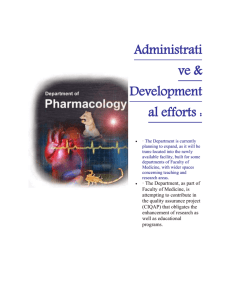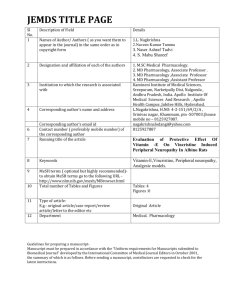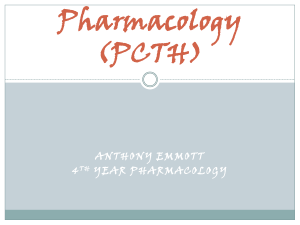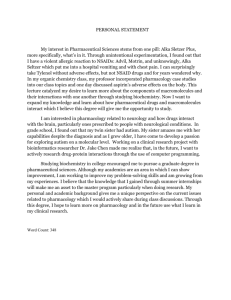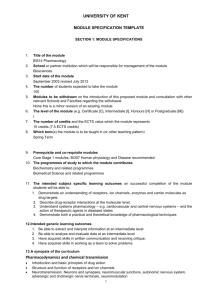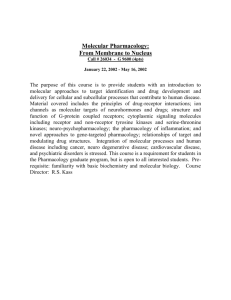BSc Pharmacology - University College London
advertisement
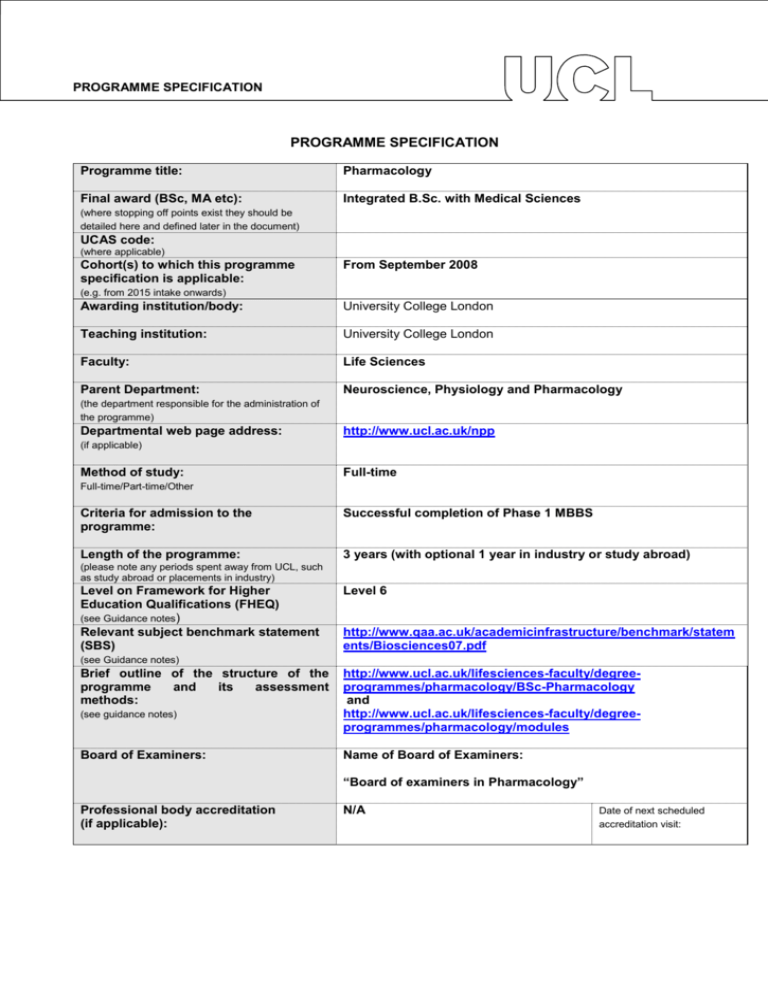
PROGRAMME SPECIFICATION PROGRAMME SPECIFICATION Programme title: Pharmacology Final award (BSc, MA etc): Integrated B.Sc. with Medical Sciences (where stopping off points exist they should be detailed here and defined later in the document) UCAS code: (where applicable) Cohort(s) to which this programme specification is applicable: From September 2008 (e.g. from 2015 intake onwards) Awarding institution/body: University College London Teaching institution: University College London Faculty: Life Sciences Parent Department: Neuroscience, Physiology and Pharmacology (the department responsible for the administration of the programme) Departmental web page address: http://www.ucl.ac.uk/npp (if applicable) Method of study: Full-time Full-time/Part-time/Other Criteria for admission to the programme: Successful completion of Phase 1 MBBS Length of the programme: 3 years (with optional 1 year in industry or study abroad) (please note any periods spent away from UCL, such as study abroad or placements in industry) Level on Framework for Higher Education Qualifications (FHEQ) (see Guidance notes) Relevant subject benchmark statement (SBS) Level 6 http://www.qaa.ac.uk/academicinfrastructure/benchmark/statem ents/Biosciences07.pdf (see Guidance notes) Brief outline of the structure of the programme and its assessment methods: (see guidance notes) Board of Examiners: http://www.ucl.ac.uk/lifesciences-faculty/degreeprogrammes/pharmacology/BSc-Pharmacology and http://www.ucl.ac.uk/lifesciences-faculty/degreeprogrammes/pharmacology/modules Name of Board of Examiners: “Board of examiners in Pharmacology” Professional body accreditation (if applicable): N/A Date of next scheduled accreditation visit: EDUCATIONAL AIMS OF THE PROGRAMME: To provide education in pharmacology of the highest quality and so produce graduates with sufficient indepth understanding and appreciation of pharmacology to be successfully applied in employment, further study, or research in pharmacology, or in a related subject, while with sufficient breadth for those who will study pharmacology no further than first degree level to successfully use the knowledge and skills developed during the degree in a wide range of careers. To offer a variety of learning experiences under the supervision of teachers actively engaged in research in pharmacology and related subjects in order to stimulate and encourage an attitude of enquiry and interest centred on the acquisition of knowledge and a desire for understanding. To continue to attract outstanding students irrespective of their origins and background and to develop their knowledge, interest and appreciation of science via teaching in pharmacology. To stimulate and sustain enthusiasm for pharmacology and to enable students to engage in the subsequent phases of their careers with initiative and confidence in their abilities. To encourage the development of the personal transferable skills that will be essential for students’ subsequent careers. To encourage an appreciation of social and commercial aspects of the application and exploitation of pharmacological knowledge and techniques. PROGRAMME OUTCOMES: The programme provides opportunities for students to develop and demonstrate knowledge and understanding, qualities, skills and other attributes in the following areas: A: Knowledge and understanding Knowledge and understanding of: 1. The mechanisms of drug action. 2. Use and actions of drugs in medicine. 3. Research methods used to investigate drug action. Intellectual (thinking) skills: 1. Critical and quantitative data analysis 2. Interpretation of experimental data 3. Critical reasoning Teaching/learning methods and strategies: Acquisition of 1 continues through all years of study through lectures, tutorials and practical, computer simulation and data analysis exercises and self-directed learning Acquisition of 2 is through a combination of the above teaching methods applied to introducing concepts of drug action in 1st year, the systematic study of drug action in 2nd year (25% of student time) and advanced teaching of selected areas of pharmacology of immediate clinical relevance in 3rd year. Acquisition of 3 begins in 1st year with a brief introduction to quantitative methods used in pharmacology and is expanded in 2nd year with 25% of student time devoted to experimental pharmacology while lectures, tutorials and self-directed learning explore and expand knowledge of research methods. Advanced knowledge of research methods is developed in 3rd year during lectures, tutorials and practical classes and by the completion of laboratory or library project course units. Assessment: A variety of assessment methods (unseen written examinations (1,2), assessed coursework (1-3) in the form of essays, data analysis exercises, and other set assignments) are used to test the student knowledge base, promote student learning and to provide feedback to students on the effectiveness of their learning. B: Skills and other attributes Teaching/learning methods and strategies: Student intellectual skills are developed through the teaching and learning programme outlined above which provided discussion of key issues, practice in applying concepts both orally and in writing, analysis and interpretation of experimental data, and individual feedback sessions for students on work produced. Assessment: The methods of assessment employed in the degree programme all place emphasis on the student’s ability to demonstrate skills 1-3 through the production of coherent written and oral responses to the assessment task set during the degree programme. C: Skills and other attributes Practical skills (able to): 1. Select, collate and present information obtained from a variety of sources 2. Obtain and synthesise bibliographically-based information 3. Design valid experimental approaches to the investigation of drug action 4. Perform experiments designed to elucidate drug action in isolated tissues 5. Quantify, analyse and present experimental results Teaching/learning methods and strategies: Skills 1 and 2 are developed in 1st, 2nd and 3rd years in response to set course work tasks and self-directed learning and are enhanced in 3rd year in response to course work tasks and critical literature review required for library and practical project reports. Students receive guidance and instruction in lectures, tutorials and practical classes on skills 3-5 and develop these skills in practical classes and in completing set course work tasks in 2nd and 3rd year. Assessment: Skills 1 and 2 are primarily assessed through set course work and the assessment of library and laboratory projects in final year and in addition is assessed in unseen written examinations particularly in final year when student learning is directed towards the research literature. Skills 3-5 are assessed in the course work and in aspects of unseen written examinations. D: Skills and other attributes Transferable skills (able to): 1. manage time and work to deadlines 2. work constructively in groups 3. work independently 4. find information and use information technology 5. communicate verbally and in writing 6. assess ideas and make valid inferences from collected information Teaching/learning methods and strategies: Development of student transferable skills is achieved within all courses which require regular written work, prepared independently or in groups (submitted by specific deadlines) and through discussion of feedback on work. Skill 1 is learnt (rather than taught) through by enabling students to experience deadlines throughout the degree programme that are notified at the start of each course. Skills 2 and 3 are developed in 2nd year in practical classes and in 3rd year courses. Skills 4-6 are developed throughout the degree programme in both formal teaching and in self-directed student learning. Assessment: Assessed course work and library and laboratory project reports are used to assess skills 1,4,5,6 while skills 2 and 3 are assessed in 2nd year practical work and by both staff and peer assessment in final year. The following reference points were used in designing the programme: the Framework for Higher Education Qualifications: (http://www.qaa.ac.uk/en/Publications/Documents/qualifications-frameworks.pdf); the relevant Subject Benchmark Statements: (http://www.qaa.ac.uk/assuring-standards-and-quality/the-quality-code/subject-benchmark-statements); the programme specifications for UCL degree programmes in relevant subjects (where applicable); UCL teaching and learning policies; staff research. Please note: This specification provides a concise summary of the main features of the programme and the learning outcomes that a typical student might reasonably be expected to achieve and demonstrate if he/she takes full advantage of the learning opportunities that are provided. More detailed information on the learning outcomes, content and teaching, learning and assessment methods of each course unit/module can be found in the departmental course handbook. The accuracy of the information contained in this document is reviewed annually by UCL and may be checked by the Quality Assurance Agency. Programme Organiser(s) Name(s): Dr Talvinder S. Sihra Date of Production: 25th April 2003 Date of Review: June 2015 Date approved by Chair of Departmental Teaching Committee: Date approved by Faculty Teaching Committee June 2015 June 2015

